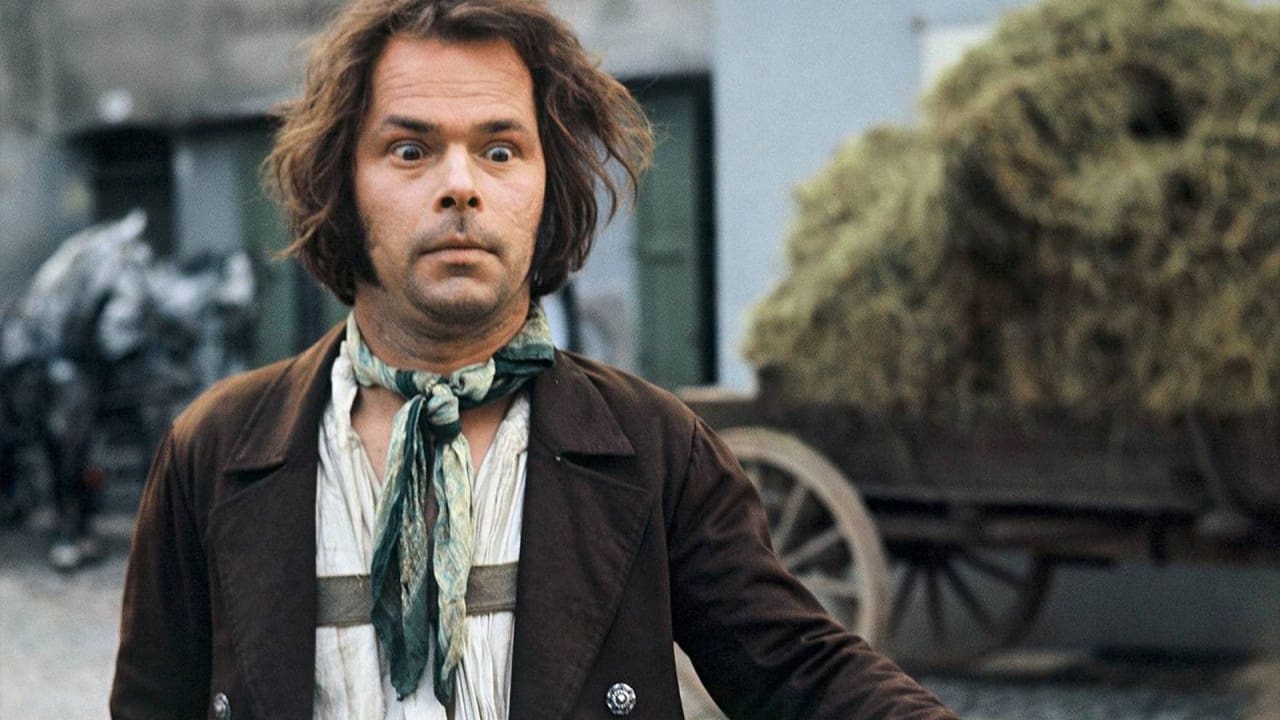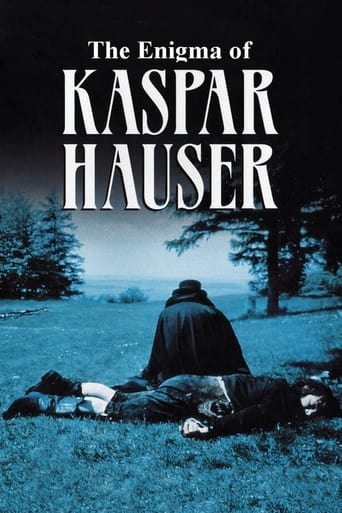

Various nations have their own stories about persons spending their childhood and/or youth outside community; in Germany, Kaspar Hauser's fate is best known - but still a mystery. Talented German filmmaker Werner Herzog created a real and tragicomic story out of it, where retarded Kaspar shows often most sympathy towards others, and his distinct questions did not fit into narrow and established structure of German society. Bruno S. as Kaspar is a wonderful finding - he was not a actor and, possessing many qualities his character had, he could be himself in many occasions. The choice of music, and beautiful German towns and landscapes provide additional value to the film. Its beginning, however, is protracted, and some scenes are torpid - apparently the approach of Herzog, but needlessly prolonging the film. As Hauser's life is generally known, then the 2nd third of the film is the most interesting, you can even giggle several times.A solid classic, at times grievous to watch, thus not to everyone's taste.
... View MoreThe film follows Kaspar Hauser (Bruno Schleinstein), who lived the first seventeen years of his life chained in a tiny cellar with only a toy horse to occupy his time, devoid of all human contact except for a man who wears a black overcoat and top hat who feeds him.This film may have actually been decent if the pace was brought up a little. The idea is interesting but I felt it wasn't told well enough. Also, the use of a 41 yo guy instead of 18 like the real guy is stupid and hated his bulging eye look which was over done.I sat through the first hour waiting for it to become a great tale but alas, I finally turned it off. The acting was too labored in the beginning, even though it got better, but perhaps a real actor may have been a better choice than a street performer which may have been chosen out of pity.
... View MoreI recently had the chance to watch Werner Herzog's The Enigma of Kaspar Hauser. While not one of the most common works of his early period, I found it captivating and touching. Kaspar Hauser was made one year after Aguirre, The Wrath of God, his first collaboration with the equally brilliant Klaus Kinski. Much like that film, Kaspar Hauser has a certain quality that is mysterious, yet beautiful. Herzog is one of those artists that I can really connect with, and I share his romantic wonder for the world and appreciate his willingness to explore its mysteries. It is through his work that we are able to catch a unique glimpse of the wondrous world we live in, as though we are seeing it for the first time. This is perfectly suitable in this case, because the main character, Kaspar Hauser, really is seeing the world for the first time.The opening of the film sets the mood perfectly, showing foggy shots of 19th century landscapes and people that seem almost like a symbol of Kaspar's own hazy mind. These shots fill the viewer with curiosity that will assuredly grow as they first see Kaspar Hauser sitting in a dark cellar, not knowing how to speak, write, walk or even stand. Bruno S. did a fantastic job as the lead character, and it is moving to watch as Kaspar puts so much effort into attempting to comply with the society he suddenly seems to be a part of.Herzog's use of music in his films has always been profound, and Kaspar Hauser is no exception. Although not used throughout very much in the film, the classic pieces of Tommaso Albinoni and Johann Pachelbel are used to their full potential when they are heard. The dream sequences in the film are quite mysterious. Presented with grainy and flickering film, they are seen in a similar way to how we perceive them in life, watching as their details are slowly forgotten.There is always a very real, documentary quality to Herzog's films which is created through his use of extended shots of people, animals, and landscapes. Also contributing to this quality is his use of real extras rather than actors, and the fact that even the main characters seem as though they are real people. It all combines to create one grand illusion, seen through with more attention and heart than most renowned filmmakers of any generation.
... View MoreThe Enigma of Kaspar Hauser is another of Werner Herzog's explorations of human extremity. In this case the character is a man who is thrust into society aged 16 with no prior experience of the human world. He spent his first years in a darkened unknown cellar, his origins remain a mystery. The fact that this is a true story only makes the events all the more remarkable.On one hand, the film looks at how someone with no preconceptions of any culture acts when suddenly confronted with them. On the other hand, it works as a damning indictment of humanity, as the primitive man at the centre of the story often comes across as more sane and reasonable than the people who try to convert him into society. The central performance by Bruno S. is a huge part of the success of the film. This non-actor brings a non-affected style to his depiction of Kaspar that seems truly authentic. In real life a man who had experienced a great deal of hardship, Bruno S. is ideally suited to this role despite the fact that he is a 41 year old man playing a 16 year old boy. This fact is never a problem and it's quite hard to see how even a skilled highly-trained actor could pull off a better performance in this unusual role. The lack of formal training of Bruno S. is in fact a clear advantage here.This is quite a typical film from director Herzog. Not only because of the focus on a highly unusual individual but also aesthetically. The film features a great deal of interesting imagery and slightly surreal moments. The shots of the fields, lake and dream, are examples of the former, while the circus sequence is a good example of the latter. And overall the film displays Herzog's typically critical view of humanity. We are certainly invited to not only empathise with Kaspar but to also see that his unique untainted way of looking at human culture is a very sane one. He infuriates academics and religious representatives equally with his so called 'primitive' observations and makes their views look somewhat foolish.Overall, this unusual product of the New German Cinema is one of Werner Herzog's best.
... View More